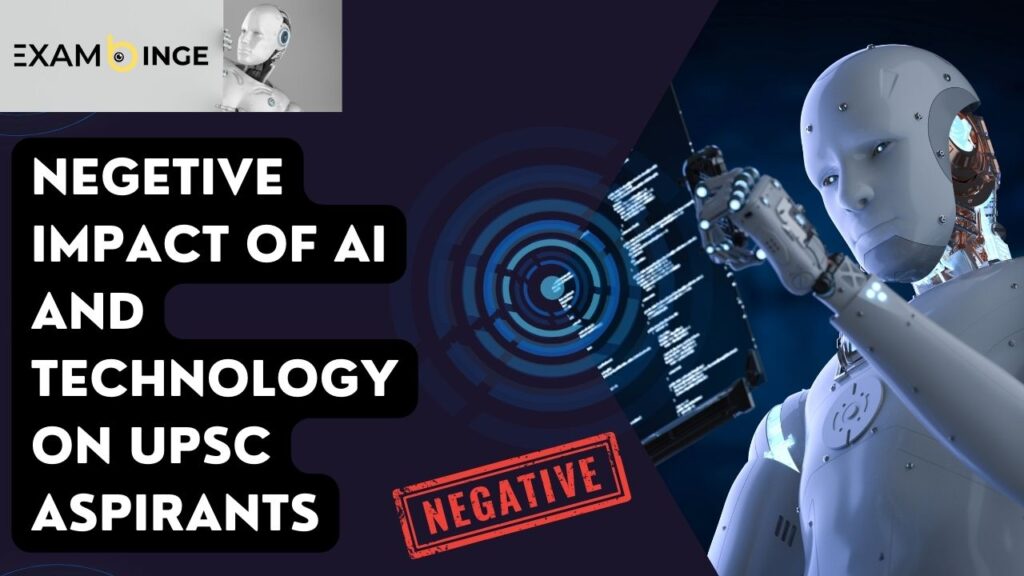The Union Public Service Commission (UPSC) exam is considered one of the most challenging and esteemed examinations in India. Every year, lakhs of aspirants prepare with the goal of securing a position in India’s civil services. As technology and artificial intelligence (AI) continue to advance, many UPSC aspirants are increasingly relying on these tools to aid their preparation. However, while these technologies offer several benefits, they also come with their fair share of negative impacts. In this blog, we will explore the negative impact of AI and technology on UPSC aspirants and how it might affect their preparation.
1. Over-reliance on AI Tools
AI tools are increasingly being used for UPSC preparation, from online classes to practice tests. While these tools can be very helpful, an over-reliance on them can reduce an aspirant’s critical thinking ability. AI is designed to provide quick answers, but it cannot replace the deep, analytical thinking required for the Mains exam. UPSC candidates need to have a thorough understanding of complex issues, and relying too much on AI can prevent them from developing the required skills for detailed analysis.
Impact: Over-dependence on AI can make aspirants less focused on understanding the subjects in-depth, instead of just getting quick answers from AI tools.
2. Decreased Focus and Increased Distractions
The internet and mobile apps offer unlimited access to study material, videos, quizzes, and more. While this can be a great way to learn, it also brings significant distractions. Many aspirants spend hours scrolling through social media, watching irrelevant videos, or checking unnecessary updates. The constant presence of technology, especially smartphones, can lead to a loss of focus, resulting in less productive study time.
Impact: Technology, especially mobile phones and social media, can create distractions, making it harder for aspirants to stay focused on their UPSC preparation.
3. Tech Fatigue and Burnout
With the increasing use of technology, aspirants often find themselves glued to screens for long hours. Continuous exposure to technology can cause eye strain, headaches, and mental fatigue. This is commonly referred to as “tech fatigue.” Spending too much time on online platforms can lead to burnout, where aspirants lose motivation and energy for studying.
Impact: Tech fatigue can harm mental health and reduce productivity, making it harder to maintain consistency in UPSC preparation.
4. Loss of Traditional Study Techniques
In the past, UPSC aspirants relied on books, notes, and newspapers for their studies. These traditional methods helped build a strong foundation and allowed aspirants to think critically and analyze the information deeply. Today, many aspirants are shifting towards digital formats, relying on online courses and AI-generated content. While this might be convenient, it can lead to a loss of essential study techniques like handwriting notes, which help in better retention and understanding.
Impact: A shift away from traditional study methods might result in poor retention and reduced overall understanding of key concepts.
5. Information Overload
One of the negative effects of AI and technology is the overwhelming amount of information that is readily available to aspirants. With just a few clicks, you can find study material, test papers, and notes on nearly every UPSC topic. However, this endless stream of information can lead to confusion, as aspirants may struggle to filter out what is essential for their preparation.
Impact: Information overload can lead to confusion and stress, making it harder for aspirants to focus on what is most important for the exam.
6. Reduced Face-to-Face Learning and Peer Interactions
Technology has made learning more flexible, but it has also reduced face-to-face interactions between aspirants and mentors. While online courses and video lectures are beneficial, they cannot replace the value of in-person discussions, debates, and peer learning. These interactions help aspirants develop a deeper understanding of topics and build their analytical skills.
Impact: Reduced in-person interactions may limit the development of communication skills and the ability to engage in meaningful discussions.
7. AI Hindering Creativity and Innovation
AI tools provide quick solutions, but they do not promote creative thinking. UPSC Mains, especially the essay and General Studies papers, require aspirants to think outside the box, form original ideas, and present solutions to complex problems. Overuse of AI can limit this creative thinking, as aspirants may become accustomed to relying on technology for ideas instead of brainstorming on their own.
Impact: Dependence on AI can stifle creativity, leading to a lack of innovation in answer writing, especially in Mains exams.
8. Mental Health Issues
The pressure of UPSC preparation, combined with the constant use of technology, can lead to mental health issues such as stress, anxiety, and depression. AI-based platforms often offer instant results, which may cause aspirants to feel discouraged if they do not perform well in practice tests. This can lead to a sense of failure and affect overall motivation.
Impact: Constant exposure to AI tools and the pressure to perform well can negatively affect an aspirant’s mental well-being, leading to stress and burnout.
9. Inequality in Access to Technology
While technology has the potential to enhance UPSC preparation, not all aspirants have equal access to it. Many students from rural areas or economically disadvantaged backgrounds struggle to afford high-speed internet, smartphones, or online learning platforms. This inequality creates a barrier in accessing the vast resources available online and can result in disadvantages for certain aspirants.
Impact: The digital divide in access to technology can put some aspirants at a disadvantage, limiting their ability to use AI and other online resources effectively.
10. Dependency on Automated Content
AI tools often generate content, such as practice questions, answers, and study materials. While this can be useful for revision, it can also lead to a dependency on automated content. Aspirants may start memorizing answers generated by AI instead of developing their own understanding and writing style.
Impact: Dependency on automated content can result in poor answer-writing skills and an inability to write original, well-analyzed answers in the Mains exam.
Conclusion
While AI and technology provide many benefits for UPSC aspirants, they also come with certain negative impacts. Over-reliance on AI tools, distractions, information overload, and a loss of traditional study techniques can affect an aspirant’s ability to prepare effectively. It’s important to strike a balance by using technology in a way that complements traditional study methods, rather than replacing them. By focusing on deep learning, avoiding distractions, and taking regular breaks, aspirants can minimize the negative impacts of AI and technology on their UPSC preparation.
Aspirants must remember that technology is a tool, not a substitute for hard work, critical thinking, and consistent effort in UPSC preparation. The key is to use it wisely and stay focused on the goal.
If you enjoyed this blog, don’t miss out on our previous one Top 12 Websites for UPSC Preparation Online in 2025




